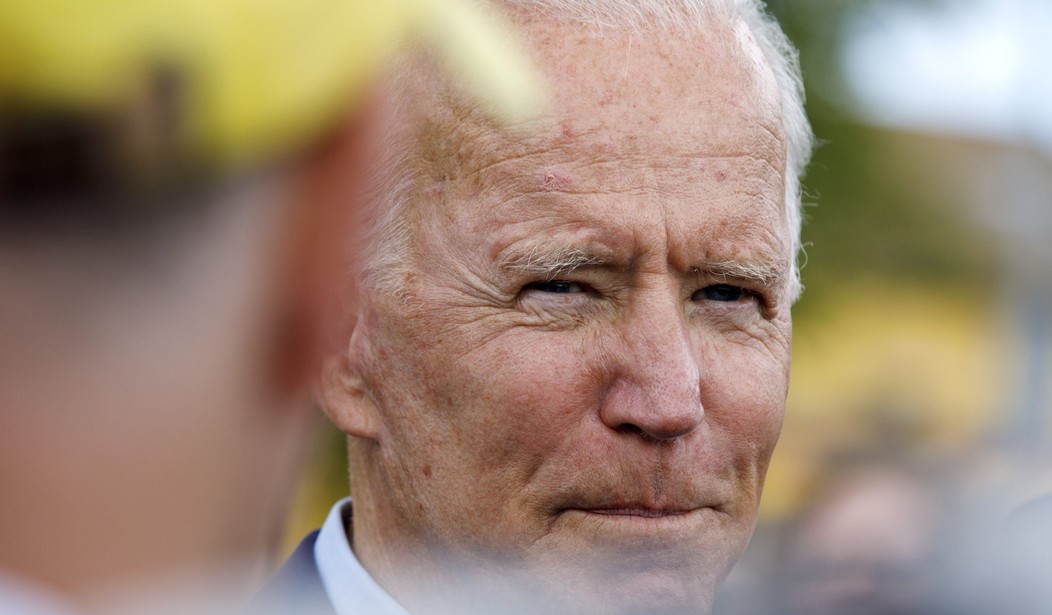On Friday, former Vice President Joe Biden told a moving story about pinning a Silver Star on an elderly Navy captain in Afghanistan. This was the latest version of a tale the 2020 candidate has told again and again. The problem is, the story is not true. In fact, it appears the tale involves three different stories jumbled together. The Washington Post‘s Matt Viser did the hard work of tracking down the truth behind the apparently manufactured story.
On Friday, Biden spun the yarn, saying a four-star general had asked him to travel to Kunar province, Afghanistan — “godforsaken country” — to pin a medal on a Navy captain. Biden, then vice president, said he brushed off concerns that the trip would be too risky: “We can lose a vice president. We can’t lose many more of these kids,” he said. According to his story, the Navy captain had rappelled down a 60-foot ravine under fire and retrieved the body of an American soldier. Now, the soldier felt like a failure.
“He said, ‘Sir, I don’t want the damn thing!'” Biden said. “‘Do not pin it on me, sir! Please, sir. Do not do that! He died. He died!'” After a moment of silence, the 2020 Democrat concluded, “This is the God’s truth. My word as a Biden.”
“Except almost every detail in the story appears to be incorrect,” The Post article explained. “Based on interviews with more than a dozen U.S. troops, their commanders and Biden campaign officials, it appears as though the former vice president has jumbled elements of at least three actual events into one story of bravery, compassion and regret that never happened.”
Biden did travel to Kunar province — as a U.S. senator in 2008, not as vice president. The soldier who braved enemy fire to save his fellows in Afghanistan — 20-year-old U.S. Army specialist Kyle J. White — received a Medal of Honor from President Barack Obama in the White House, not a Silver Star pinned on him by Biden.
“The upshot: In the space of three minutes, Biden got the time period, the location, the heroic act, the type of medal, the military branch and the rank of the recipient wrong, as well as his own role in the ceremony,” Viser summarized. Ouch.
In fact, Biden went on to say he had been “in and out of Afghanistan and Iraq over 30 times.” His campaign had to issue a clarification: the correct number is 21.
One aspect of Biden’s story did turn out to be true, however. The vice president did pin a medal on a U.S. soldier in Afghanistan — not in Kunar province but in Wardak. Army Staff Sgt. Chad Workman, 35, had pried open a burning vehicle to save his dying friend. By the time he got the door open, however, there was no hope.
“I never pulled him out because he was melting,” Workman told The Post. When he learned that Biden would pin a Bronze Star on him for heroism, the soldier — who has since been promoted to first sergeant — “tried to get out of going.”
“I didn’t want the medal,” Workman recalled. Yet on January 11, 2011, Biden pinned the medal to his chest. Biden recalled, “You see the look on his face — he says, ‘Sir, I don’t want it. I don’t want it. He died. he died.”
Workman added one detail: he remembered Biden meeting his gaze and saying, “I know you don’t.” Recalling the moment eight years later, the soldier said, “I feel like he really understood.”
That moving story seems to have been melded in with other tales in Biden’s mind.
Biden took the flight to Kunar province in 2008 with his fellow Senators Chuck Hagel (R-Neb.) and John Kerry (D-Mass.). The three watched as Maj. Gen. David Rodriguez presented a Bronze Star for valor to Spec. Miles Foltz, who braved Taliban fire to rescue Spec. Tommy Alford, who had been struck by a Taliban bullet in his jaw and neck. Foltz pulled him to safety, stanched his bleeding, and took over his weapon. Alford survived the battle and even returned to his unit.
Biden told the story in 2008 after he returned, but seems not to have repeated it again until July 2016. In this telling, the vice president switched out the young Foltz for an elderly Navy captain who “climbed down about 200 feet” into a ravine and retrieved a wounded friend who died. The Bronze Star was upgraded to a Silver Star, and Biden — not the general — pinned it on the man, who said, “I do not want it.”
In October of that year, Biden told the story again, only this time he said the ceremony took place in Iraq and instead of rappelling down a ravine, an Army captain pulled a dead soldier out of a burning Humvee. The Pentagon has no record of an Army captain receiving a Silver Star in Iraq during the time period Biden described.
Three weeks later, Biden told the Iraq and Afghanistan versions of the story back to back in a single speech.
The former vice president’s mounting gaffes may threaten to undo his campaign, much the way plagiarism undid his 1988 run for president.
In recent weeks, Biden has: claimed the Heritage Foundation said Trump’s tax cuts didn’t work; claimed that he was vice president during the Parkland shooting last year; said that “poor kids are just as bright and just as talented as white kids;” mixed up Margaret Thatcher with Theresa May and Angela Merkel; claimed that 40 students were shot at Kent State in 1970 — rather than the 13 who were shot; claimed that Robert F. Kennedy and Martin Luther King, Jr. were killed in the 1970s — rather than in 1968; and more. He mixed up the locations of the tragic shootings in El Paso, Texas, and Dayton, Ohio.
In a moment worthy of satire, the former vice president actually dared to insist, “I want to be clear, I’m not going nuts.”
This morphing story of valor is but one more worrying sign that Biden may have lost it.
Follow Tyler O’Neil, the author of this article, on Twitter at @Tyler2ONeil.









Join the conversation as a VIP Member